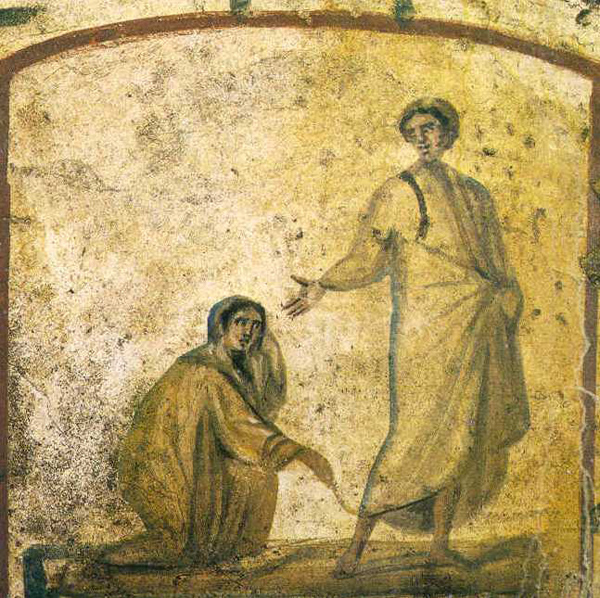My absolute favorite line from this Gospel reading is, “Then he put them all out.” I can just imagine Jesus going into the house, encountering the mourners, seeing the lack of faith in all of them, and saying “Go on! Get outta here! I’ve got work to do!” Or at least that’s how I’d say it!
It might be a funny little line, but I think it makes a significant point, and sums up the point made by the Liturgy of the Word we have for today. Faith is necessary in our relationship with God and in receiving God’s blessings and in living the life for which he has created us. Those incredulous mourners were symptomatic of a people who had abandoned hope of God’s interest in them. They were so abused by the scrupulous religious establishment, that they didn’t really even know God, nor did they believe that God cared about them. So all that was left for them was to mourn, because, as far as they knew, there was nothing for which to look forward. The only thing Jesus could do, then, was to put them out of the house, so that he could respond to the faith of Jairus, the synagogue official, the father of the girl, who had called Jesus to come.
That’s not so different from the situation with the woman who somewhat detained Jesus on the way to Jairus’s house. This poor woman had placed her faith in “many doctors,” who apparently did nothing but increase her suffering. She seems to have had a stirring of faith, or maybe it was even a last ditch effort, a “Hail Mary,” if you will, and that leads her to touch the garment of Jesus as he passes by. She makes an act of faith: “If I but touch his clothes, I shall be cured.” And in this humble act of faith, in which she undoubtedly hopes to go unnoticed, she finds that no act of faith is ever unnoticed by Our Lord. Even though the disciples laugh at him for wanting to know who in the pressing crowd touched him, Jesus, who surely already knew who it was, acknowledges this woman of faith and responds to that act of faith.
“God did not make death,” as the wisdom author in our first reading tells us. And because he did not make death, he has given us faith as a remedy for its effects on our lives. Maybe we won’t be miraculously cured like the hemorrhagic woman, and maybe we won’t be raised from the dead like the daughter of Jairus. But we absolutely will experience resurrection and new life when we join ourselves to Christ who has triumphed over death. That experience requires faith, and we must make it our constant care to exercise that faith, live that faith, and to “put out” of our lives any negativity, any dependence on worldly remedies, anything, really, that interferes with that faith. Each of us must be absolutely willing to “put them all out” and react in faith to all that God wants to do in our lives. Because our lives depend on it. They really do.
And we can have that faith every day, because Christ is risen! He is risen indeed! Alleluia!


You must be logged in to post a comment.